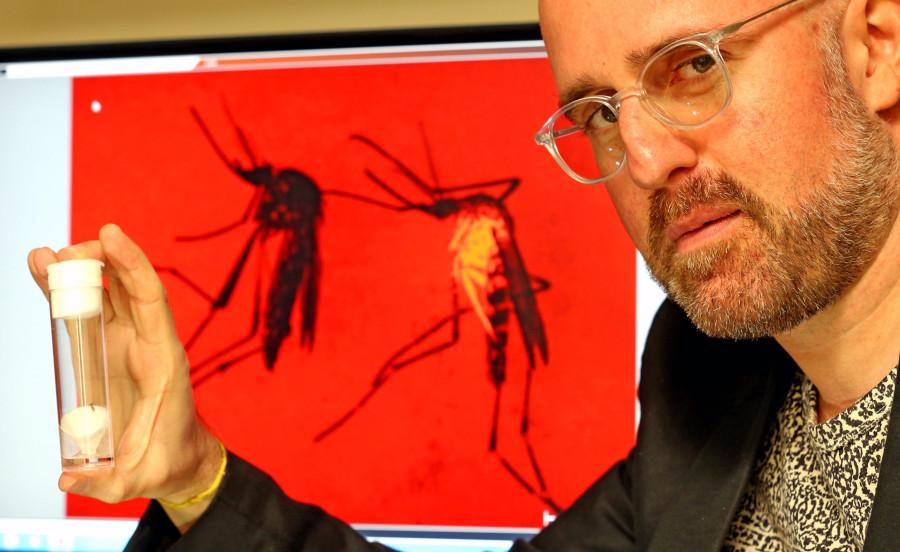A little bug ruins the big game: How the Zika virus is affecting the Olympics
courtesy of MCT Campus/Charles Trainer Jr.
Florida International University Matthew DeGannaro holds a bottle with a mosquito used in his research to help combat the Zika virus that is transmitted by the mosquito.
February 23, 2016
The Olympics has been the world’s greatest sporting event for more than a century. Even when mankind was in its darkest time, we still banded together for this showcase of human strength, skill, and power. And now the games are being threatened by mosquitoes.
Impossible, isn’t it? How could our world’s best athletes, the pinnacle of human strength, be threatened by a simple insect?
These little bugs are carrying the Zika virus, a non-fatal but debilitating and untreatable disease that causes fever, rash, joint pain, and conjunctivitis. More recent articles question if Zika (combined with other viruses) is contributing to paralyzation. It has been spreading rapidly throughout several countries such as Costa Rica, Ecuador, and Brazil- where the 2016 Summer Olympics are to be held.
If you were a world-class athlete, preparing for your Olympic experience, how would you feel about competing in Brazil?
The World Health Organization recently declared that the rapid spread of the Zika virus constitutes “an international public health emergency.” They are now re-doubling their efforts to create a vaccine for the virus and halt its growth.
According to the Washington Post health reporters, “the WHO said the pathogen, which was virtually unheard of in the region a year ago, is spreading so fast that it could infect as many as 3 million to 4 million people within 12 months.”
In early February, President Barack Obama announced that he would ask Congress to approve his plan to fight the Zika virus. He is requesting “1.8 billion dollars to stop the Zika virus, with 200 million dollars going to research that will help defeat the disease via a future vaccine.”
The Brazilian government has called for calm. For most people, the disease is mild. Alarming reports, though, are about the children of infected pregnant women. These babies have been born with several defects, including microcephaly, or irregular smallness of the head, which can lead to brain deformities. The CDC is trying to determine a causal link.
Several Olympic athletes have considered pulling out of the Olympics. Hope Solo, the U.S. female national team’s goalkeeper said in an interview “If I had to make the choice today, I wouldn’t go.”
The U.S. Olympic committee has urged competing teams to take precautions when attending the event and to not compete if they truly fear for their health.
In addition to athletes, thousands of visitors, training personnel and volunteers must make decisions about attending.
Mr. Jeremy Brown, work study coordinator and a volunteer at the 2016 Summer Olympics, said “Zika is obviously a health concern, but it shouldn’t affect the games. If you simply take precautions and make smart choices, then there’s nothing to worry about.”
In Brazil, over 1 million people have contracted the virus. While there are no reported cases of the disease originating in America, international travelers have come to the U.S. carrying the infection.
On February 11, the state of Maryland announced its first confirmed case of the Zika virus. The patient had traveled out of country, only to return infected. They are now being monitored by the CDC.
On February 18, Pope Francis took the unprecedented step of recommending that women in countries where Zika is active may use birth control, which is against Catholic beliefs. Brazil and other infected countries have advised all women to not become pregnant until 2018 in fear of the babies being affected.
The most worrisome aspect of the Zika virus is its rapid spread throughout the globe. The high infection rate has created panic.
“I think the Zika virus is certainly getting a lot of media attention, but I don’t think it’s as severe as everyone is making it out to be,” said Brown.
The athletes’ fears are understandable. No one would want to travel to an area where disease is running rampant. It would be more concerning if they didn’t fear for their health.
The Zika virus, as foreboding as it may seem, can be avoided with bug spray. NPR published a study of the most effective insect repellents.
The Olympics are a historic event that have inspired humanity for centuries. Now for the first time in history, 2016 may be the first year where they are cancelled for something other than a World War.
I’m not a fan of bugs, but I never thought a global panic would be caused by a mosquito.







